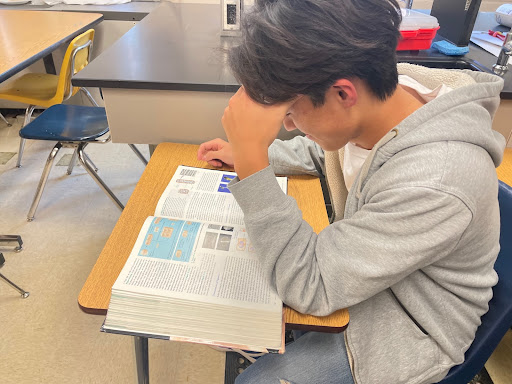Class rank: An exclusive, outdated system

Fourth in the class of 2024 Jason Fang, studies for one of his AP classes. As class rank is determined by GPA, high-ranking students take many AP classes for the GPA boost.
Have you ever noticed how some students take five Advanced Placement classes, two Dual Enrollment classes and maintain a sky-high GPA? Have you ever wondered why? Some enjoy a packed schedule, but most are trying to climb the ladder that is the class ranking system.
“Your rank is based on GPA and there’s a lot of weighted and unweighted aspects to it, but from what I understand, it’s a relatively simple calculation that can get complex,” Matthew Burgess, AP Language and Composition teacher, said.
With AP and DE classes carrying more weight, rank climbers are more inclined to take these challenging courses, even if they have no interest in the subject matter. Sometimes, these overachievers will take two classes of the same subject if it means their GPA will increase by a tenth of a point.
“I feel like some people aren’t confident in their ability to measure themselves,” Tyler Yang (11) said. “With class rank, it’s just a way to get yourself up there. It’s not built through your ability to find a passion; it’s just ‘take the courses and get them done.’”
This detached method of getting through school does not suit most high school students. The students who just fall short of gaining the valedictorian or salutatorian title barely receive recognition for their hard work through all four high school years.
“[Class rank] is a very exclusive thing,” Burgess said. “It could be used for other purposes if it were more inclusive. I believe social competition is good, but it needs to be for a wide array of things.”
Furthermore, the common misconception that students need a high rank to get into a good college is perpetuated by this behavior.
“From what I’ve heard, for top-ranked institutions, they don’t care about the specific number [rank] if you’re in the top one percent,” Yang said. “Past that, even the top five percent is very good and top 10 percent is good, so it’s all about percentages. Because if you’re number one in a class of ten, no one really cares, but if you’re number one in a class of one thousand, that’s a lot more impressive.”
Many students, especially in honors and advanced classes, bite off more than they can chew for a top ten or twenty rank. Taking courses that may be beyond their capabilities results in hours of sleep lost and compounded stress, further proving the low worth of that rank. A dedicated student could fall ten or even fifty ranks for a “B” earned in middle school. Their classmate, who somehow scrapes making straight As, could be in the top twenty. Therefore, many teachers and colleges believe that class rank alone is never indicative of a student’s abilities.
“I never look at class rank,” Burgess said. “For me, it’s one of those barometers to see who’s gonna be valedictorian and salutatorian, and that’s all it’s for. I’m trying to think of the feelings of people in third, fourth, fifth through tenth place … do they feel like [it’s] an accomplishment being in the top ten? I’m not saying competition’s a bad thing, but I’m thinking it could be more inclusive.”
A more inclusive ranking system may take value away from top spots, but this may not be bad. School can be a much more rewarding experience if students take classes they have an interest in or take on only what they can handle. As a result, these students can spend more time on clubs, community service, hobbies or building their resumes in more ways than just their GPA. Colleges weigh all of these aspects in addition to class rank, making it just another good statistic and not the whole story.
“I’d put more focus into other activities and excel there because, at the end of the day, class rank doesn’t matter that much if you have nothing else to show for it,” Yang said.
Your donation will support the student journalists of White Station High School. Your contribution will allow us to purchase equipment and cover our annual website hosting costs.







































